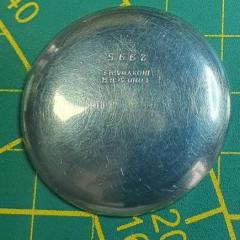Some feedback from a beginner
-
Recently Browsing
- No registered users viewing this page.
-
Topics
-
Posts
-
I'm a little confused here before servicing everything was fine and now it's not? Then I'm assuming if you run it without the chronograph modular runs just fine or does it give you problems then? Then as far as tightening goes I've occasionally seen people use a staking set and sometimes it works sometimes it doesn't. You can also disassemble and flip it over that sometimes works. Otherwise try eBay and maybe one will come up. There is a tiny possibility if the Problem is on the gear part and not on the center tube that you could purchase a shorter version and pop it on your longer version that's a speculation on my part that may be that might work but if the tube itself is worn then you're going to have a problem then it's back to eBay and just try to find one in the first place all sorts of things will show up on eBay sooner or later.
-
By nickelsilver · Posted
Why do you need a whole balance assembly (balance complete)? Staffs are readily available and cheap. -
By watchweasol · Posted
Hi welcome to the forum. Enjoy. dictionary_ebauches_sa.pdf TZIllustratedGlossary.pdf -
Righty ho, I re-serviced the chrono module and got a reasonable result with minimal loss of amplitude when not running the chrono and about 30 degrees loss when running. Great. The problem is now that the chrono (and movement) stops running after about a minute or so, a tap on the watch starts it running again. No issues with the movement running when the chrono is stopped. Going to service it yet again, obviously some residual issues with friction in the chrono module (Very frustrating - I wish there was some way of testing it as I go!) I also seem to have a problem with the cannon pinion where the movement is running continuously (with the chrono stopped) but it's losing significant time / stopping. This is one of those two piece ETA style with a driving wheel pressed over the cannon pinion, obviously arranged for driving the chrono module. I had no issues with this prior to service and just added a small amount of grease between the driving wheel and the centre cannon pinion as the technical guide required. What's the best way of tightening these up? I would like to replace it but I guess this is going to be hard to find as it is dedicated to the DD chrono movement.
-
He uses the micrometer cap, but he leaves the spring out (you can see that in the video). If you leave the spring in, the spindle will move up as well (as shown by @Knebo).
-




Recommended Posts